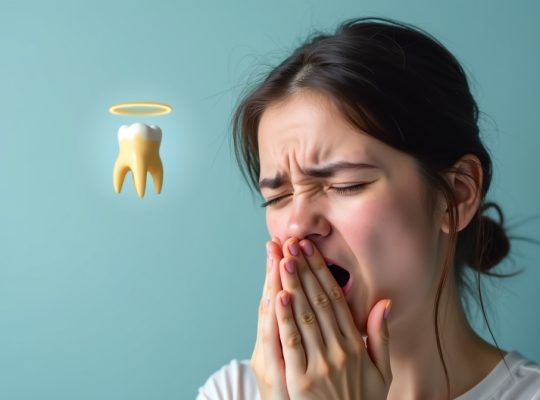Tooth sensitivity is an uncomfortable and all-too-common problem that many of us experience at one point or another. One moment, you’re enjoying a cup of hot coffee or a cold ice cream, and the next, a sharp, zinging pain shoots through your teeth, making you wish you hadn’t indulged. This type of pain can be sudden and intense, often leaving you wondering why your teeth are acting up.
Tooth sensitivity, also known as dentin hypersensitivity, occurs when the soft tissue inside your teeth—the pulp—becomes exposed to external elements like cold or hot temperatures, sweet or acidic foods, or even air. It’s a common issue, but not always easy to pinpoint exactly what’s causing it. Understanding the different reasons for this pain can help you find a way to manage it and prevent further discomfort.
Common Causes of Tooth Sensitivity
There are many reasons your teeth might start hurting when you least expect it. While some causes are more noticeable, others may sneak up on you gradually. Let’s look at some of the most common triggers.
Gum Recession
Gum recession occurs when the gums pull back from the tooth, exposing the sensitive roots underneath. Normally, your gums protect the tooth roots, but when they recede, they leave them vulnerable to outside stimuli. As you get older, gum recession can become more pronounced, especially if you’ve been brushing too aggressively or have gum disease.
- Aggressive brushing: Using a hard-bristled toothbrush or brushing too forcefully can wear down the gum line.
- Gum disease: Infections or poor oral hygiene can cause the gums to recede.
Enamel Erosion
Enamel is the hard, protective outer layer of your teeth. It acts as a shield against harsh substances like hot coffee, cold drinks, and acidic foods. However, over time, enamel can wear down due to different factors, such as acidic foods, acid reflux, or grinding your teeth. Once this enamel is gone, the dentin underneath is exposed, and this can cause pain when eating or drinking certain things.
- Acidic foods and drinks: Citrus fruits, soda, and wine can eat away at the enamel.
- Teeth grinding: Grinding your teeth, especially at night, can wear down the enamel.
- Acid reflux: Stomach acid rising up into the mouth can slowly erode enamel.
Cavities and Tooth Decay
Tooth decay is one of the most common causes of tooth pain. When cavities form, they expose the inner layers of the tooth, which contain nerves and blood vessels. This can lead to sharp pain, especially when the cavity reaches deeper into the tooth. If you’re noticing sensitivity to sweets or temperatures, it could be a sign that a cavity is forming or has already developed.
- Untreated cavities: Cavities that aren’t treated can worsen over time, leading to more pain.
- Plaque buildup: Plaque, which is a sticky film of bacteria, can cause decay if not removed regularly.
Dental Procedures
Sometimes, dental work can trigger temporary tooth sensitivity. If you’ve recently had a filling, cleaning, or even a root canal, it’s normal to feel some discomfort. This is usually temporary and should subside after a few days or weeks. However, if the pain persists, it might indicate a problem with the procedure itself, such as an improperly placed filling or an infection.
- Fillings: After a filling, your tooth might be sensitive to temperature or pressure for a while.
- Root canals: After root canal therapy, some pain or discomfort is common, but it should ease up over time.
Cracked Teeth
Cracks in your teeth can be difficult to notice, but they are another common cause of tooth pain. A crack might expose the inner layer of your tooth, causing sensitivity to hot, cold, or sweet foods. Sometimes, the pain may not be constant but can be triggered by chewing or certain temperatures.
- Chewing hard foods: Biting down on hard foods or ice can cause tiny cracks in the tooth.
- Trauma or injury: A blow to the mouth can lead to a cracked tooth.
Whitening Products
Whitening treatments, whether done professionally at the dentist or at home, can cause some temporary sensitivity. The chemicals used in these products can penetrate the tooth enamel and irritate the nerves inside the teeth. This can lead to discomfort that may last for several hours or days.
- Overuse of whitening products: Using whitening products too often or leaving them on for too long can increase sensitivity.
- Professional whitening treatments: While effective, they can sometimes cause more sensitivity than over-the-counter products.
Sinus Issues
Did you know that sinus infections can lead to tooth pain? The roots of your upper teeth are located very close to the sinuses, so when your sinuses are congested or inflamed, they can put pressure on the roots of your teeth, leading to pain. This type of toothache is often mistaken for a dental issue.
- Sinus infections: Swelling in the sinuses can cause referred pain in the upper teeth.
- Allergies: Seasonal allergies can also cause sinus pressure and discomfort in the teeth.
Diet and Lifestyle Habits
Certain foods and drinks are known to cause irritation to sensitive teeth, especially when consumed regularly. If you’re consuming a lot of acidic foods or sugary treats, you might notice an increase in tooth sensitivity. Likewise, habits like smoking can contribute to gum disease and enamel erosion over time.
- Acidic foods: Citrus fruits, tomatoes, and vinegar can wear down enamel.
- Sugary snacks and drinks: Frequent sugar intake feeds the bacteria in your mouth that cause cavities and decay.
- Smoking: Smoking can weaken the gums and increase your risk for tooth sensitivity.
Tooth Sensitivity Due to Age
As we age, our teeth naturally become more vulnerable to sensitivity. The enamel wears down over time, and gum recession becomes more common. While tooth sensitivity might affect younger individuals, it tends to increase with age, especially if oral hygiene practices have been inconsistent.
- Natural aging process: Enamel naturally wears down with age, exposing the sensitive parts of the teeth.
- Hormonal changes: Hormonal shifts, especially during pregnancy or menopause, can impact gum health and sensitivity.
Tooth Sensitivity from Whitening
While teeth whitening can give you a brighter smile, it often leads to increased tooth sensitivity, especially when used too frequently. Over-the-counter whitening strips, as well as professional treatments, can cause temporary pain, especially if the whitening agent comes into contact with the gums.
- Chemicals in whitening products: These can irritate the nerve endings in the tooth.
- Overuse of whitening products: Using them too frequently can increase the chances of tooth sensitivity.
Final Thoughts
Tooth sensitivity is a common problem, but it doesn’t have to be a mystery. By understanding the underlying causes, you can take proactive steps to reduce discomfort and protect your teeth. Whether it’s adjusting your brushing technique, treating a cavity, or changing your diet, there are many ways to manage tooth sensitivity. However, if the pain continues or worsens, it’s always best to consult with your dentist to rule out any serious issues.
The key to keeping tooth sensitivity at bay lies in good oral hygiene, regular dental check-ups, and being mindful of what you consume. If you’re experiencing persistent or severe pain, don’t ignore it—getting to the root of the problem is the best way to protect your smile for years to come.






